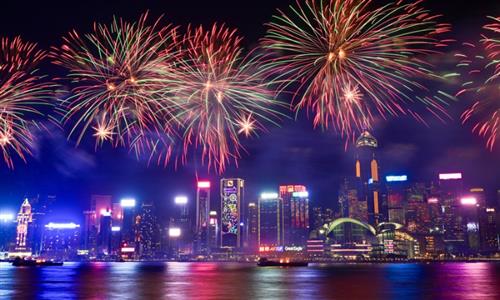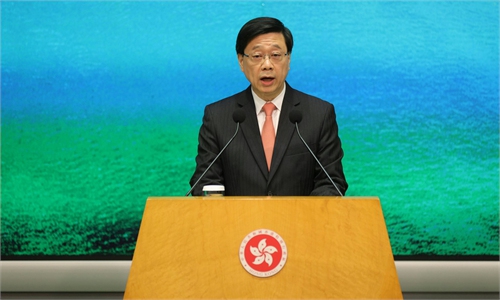
Illustration: Chen Xia/GT
According to Hong Kong media outlets, Xia Baolong, director of the Hong Kong and Macao Affairs Office of the State Council, will make a six-day visit from Thursday to gather feedback on Article 23 legislation.Earlier, Hong Kong has begun a four-week public consultation on Article 23. Once again, the legislation, which is long overdue, has drawn attention from those who truly care about the future of Hong Kong and those who have malicious intentions.
In the 1990s, when the Basic Law was first drafted, Article 23 was not there. Because it is "national" security, so the "nation," not the region, should be responsible. The central government agreed that Hong Kong can enact its own national security law, given that Hong Kong operates a different legal and judicial system. Therefore, Article 23 was inserted in part 2 of the Basic Law which governs the central-local relationship.
However, after giving it away, the central government was also concerned about whether Hong Kong would ever enact national security laws on its own and therefore the wordings of Article 23 used the word "shall" which means it is mandatory for Hong Kong to enact the legislation. That is why it is Hong Kong's "constitutional" duty to enact Article 23 related legislation. In other words, Hong Kong has neglected its "constitutional" duty for some 27 years, since 1997.
In the absence of any valid and effective national security law, foreign powers were able to insidiously exploit this loophole and to seize the opportunity to groom local subversive forces which gradually became an army of rebellious residents to "Occupy Central" in 2014 and further geared up violence in the 2019 black-clad riots.
The new national Article 23 legislation includes a number of proposed new offences including levying war; instigating a foreign country to invade the country and assisting public enemy at war; secession (meaning to withdraw a part of China from its sovereignty or resisting the central government in its exercise of sovereignty over a part of China); subversion (meaning to seriously threaten the country's security and stability by nonviolent means such as electronic sabotage); espionage and foreign interference with our political and legal structures.
One can now immediately see that there exist so many holes to patch and gaps to fill in our national security law system. Article 23 legislation is imminent and necessary in this day and age when Hong Kong is extremely intertwined in the geopolitical turmoil between the East and the West.
Some antiChina Western media responded to Hong Kong's proposed enactment of Article 23 legislation by saying that Hong Kong will be turned into "isolation." Some Western countries used the cliche such as "weakening Hong Kong's freedom" to denounce the move by the government of Hong Kong Special Administrative Region. When some Western media cannot fairly see that their own country also has complicated, extensive and draconian national security laws that effectively deal with and ameliorate many of the national security threats in their home country, they are just being hypocritical and xenophobic, if not "Sinophobic."
Hong Kong's freedom of expression is constantly and continuously protected by the Basic Law and has been fully respected by our court of law. It is those speeches that are insidiously instrumental in subverting or demolishing our political institutions which stray beyond reasonable criticism that attracts criminal liability. Well-informed criticism providing a balanced view and aiming to help improve a policy is most welcome. Making baseless accusations, reckless as to the truth, may be tolerated in a Western society, but they are not acceptable in the future in Hong Kong.
Even after the proposal becomes law, these new offences will rarely be used to lay charges and hardly anyone will be prosecuted under these new offences because they are to target the very scarcely few. The general public need not worry at all because a vast majority of them would not have any subversive or seditious intention toward their own government. Hong Kong will become a safer city, equipped with its advanced national security laws comparable to many advanced common law countries, rather than lagging behind in outdated colonial statutes with offences that are ineffective and useless. Hong Kong will no longer be susceptible to manipulation or infiltration by international anti-China forces aiming to use this city to destabilize either the HKSAR government or the Chinese central government.
The author is a barrister and chairman of the Hong Kong Legal Exchange Foundation. opinion@globaltimes.com.cn


